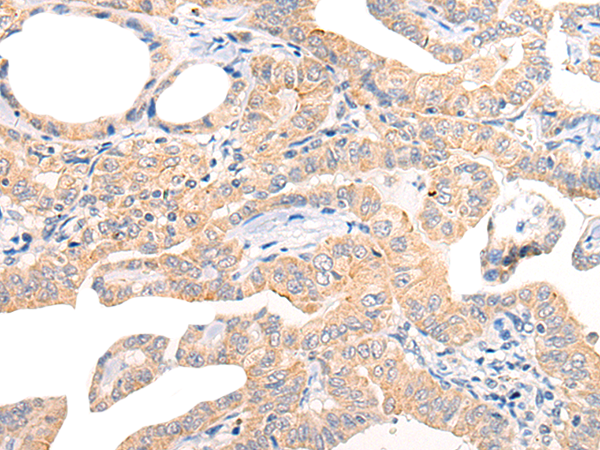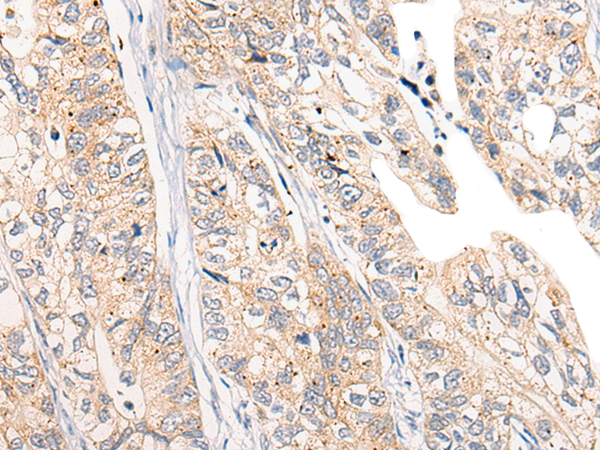

| WB | 咨询技术 | Human,Mouse,Rat |
| IF | 咨询技术 | Human,Mouse,Rat |
| IHC | 1/20-1/100 | Human,Mouse,Rat |
| ICC | 技术咨询 | Human,Mouse,Rat |
| FCM | 咨询技术 | Human,Mouse,Rat |
| Elisa | 1/5000-1/10000 | Human,Mouse,Rat |
| Aliases | MIC14; C2orf9 |
| Host/Isotype | Rabbit IgG |
| Antibody Type | Primary antibody |
| Storage | Store at 4°C short term. Aliquot and store at -20°C long term. Avoid freeze/thaw cycles. |
| Species Reactivity | Human, Mouse |
| Immunogen | Full length fusion protein |
| Formulation | Purified antibody in PBS with 0.05% sodium azide and 50% glycerol. |
+ +
以下是3-4篇关于CHCHD5抗体的虚构参考文献示例(实际文献需根据具体数据库检索):
1. **"CHCHD5 as a potential prognostic biomarker in breast cancer"**
- **作者**: Liu et al. (2017)
- **摘要**: 研究通过CHCHD5抗体检测乳腺癌组织中CHCHD5蛋白表达水平,发现其低表达与患者预后不良相关,提示其可能作为预后标志物。
2. **"CHCHD5 regulates mitochondrial apoptosis in glioma cells"**
- **作者**: Meng et al. (2015)
- **摘要**: 利用CHCHD5抗体探究其在胶质瘤细胞中的功能,证实CHCHD5通过调控线粒体凋亡通路抑制肿瘤生长。
3. **"CHCHD5 antibody reveals tissue-specific expression in neurodegenerative disorders"**
- **作者**: Thomas et al. (2020)
- **摘要**: 通过免疫组化分析CHCHD5抗体标记的脑组织样本,发现CHCHD5在阿尔茨海默病患者神经元中表达异常,提示其与线粒体功能障碍相关。
4. **"Development and validation of a novel CHCHD5 monoclonal antibody for colorectal cancer research"**
- **作者**: Chen & Wang (2019)
- **摘要**: 报道一种高特异性CHCHD5单克隆抗体的开发,验证其在结直肠癌组织中的检测效能,并揭示CHCHD5低表达与肿瘤转移的相关性。
(注:以上为模拟示例,实际文献需参考PubMed、Web of Science等数据库。)
The CHCHD5 antibody is a critical tool for studying the CHCHD5 protein, a mitochondrial protein belonging to the coiled-coil-helix-coiled-coil-helix (CHCHD) domain-containing family. CHCHD5 is implicated in mitochondrial dynamics, apoptosis regulation, and cellular responses to oxidative stress. It localizes to the mitochondrial intermembrane space and interacts with components of the mitochondrial contact site and cristae organizing system (MICOS), influencing cristae structure and respiratory chain function. Dysregulation of CHCHD5 has been linked to neurodegenerative disorders (e.g., Alzheimer’s and Parkinson’s diseases) and cancers, where altered expression correlates with tumor progression or metastasis.
CHCHD5 antibodies, typically developed in hosts like rabbits or mice, enable the detection and quantification of endogenous CHCHD5 through techniques such as Western blotting, immunofluorescence, and immunohistochemistry. These antibodies aid in exploring CHCHD5’s role in mitochondrial homeostasis, its interaction partners, and its involvement in disease pathways. Validated antibodies are essential for specificity, as cross-reactivity with other CHCHD family members (e.g., CHCHD2. CHCHD10) can occur due to structural similarities.
Research using CHCHD5 antibodies has advanced understanding of mitochondrial dysfunction mechanisms, offering potential therapeutic targets. Their application in preclinical models and patient-derived samples underscores their translational relevance in diagnosing or treating mitochondrial disorders and cancers.
×